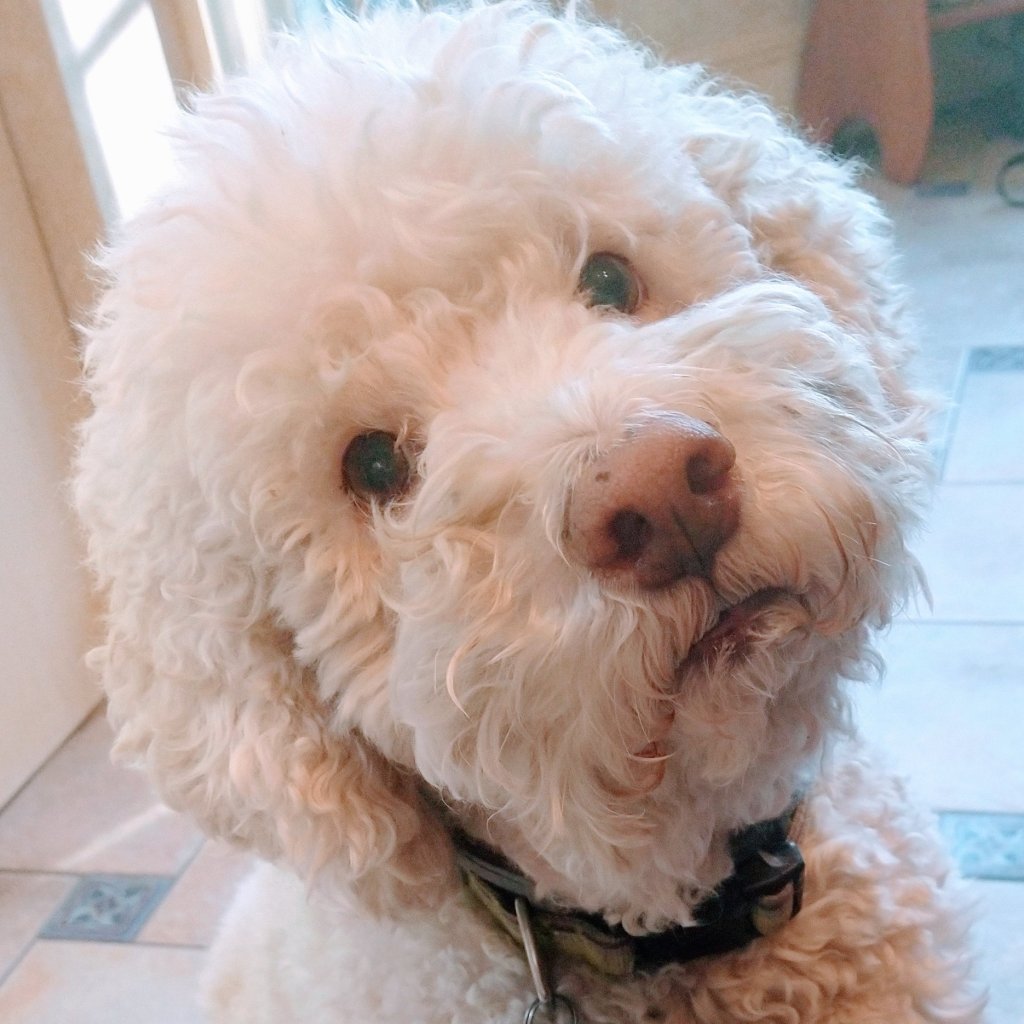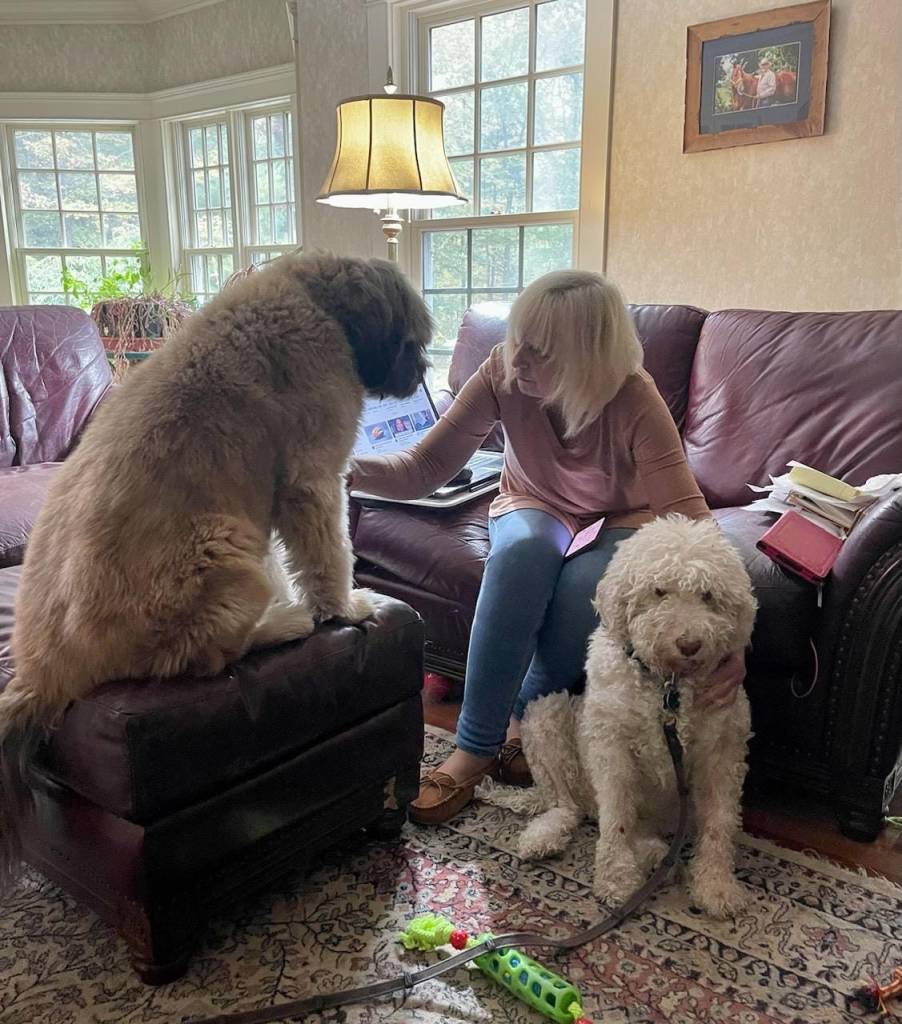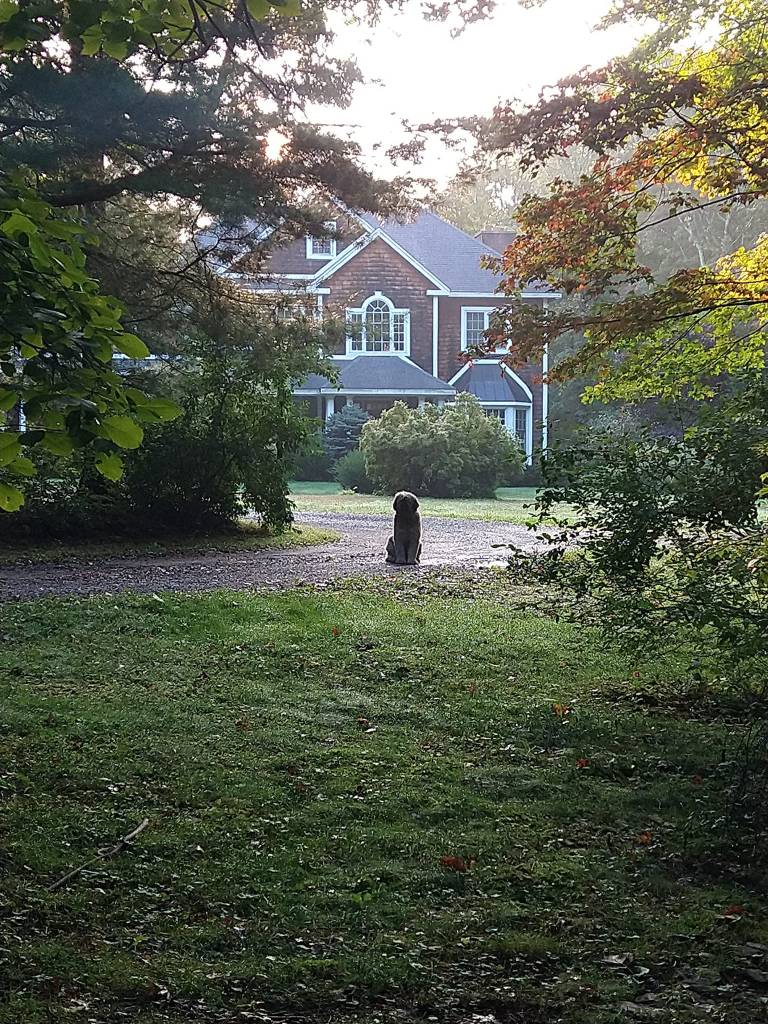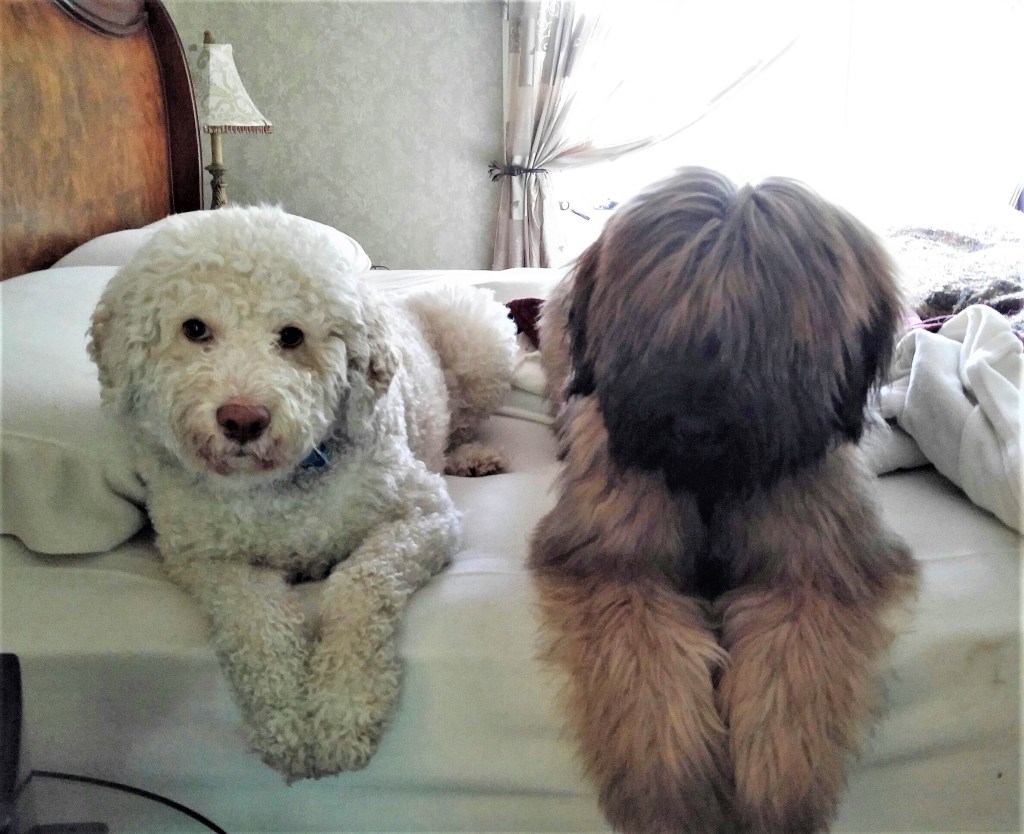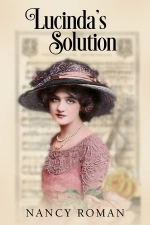Theo
I haven’t written in a really long time.
I’ve been putting all my energy into my art. I’ve been painting several times a week, and teaching watercolor workshops that have energized me in a totally new way. I’ve never taken so much joy in seeing other people succeed. No wonder teachers accept low pay and hard work. (They shouldn’t – but now I know why they do.)
Adults come to my workshop saying “I don’t know why I’m here – I don’t have any artistic talent.” And they leave saying, “I’m going to buy a frame on the way home.”
And the kids! They are so creative and mostly pay no attention to instructions. And I love them for it. I said to one kid, “That’s really good.” And he said, “It’s perfect.”
Just look at this. The same dog painted by a mom and her 10-year-old son. Both adult and child know how to portray love.
But that’s not the only reason why I haven’t written.
I let too much time go by because I couldn’t share my sad news. And then, after so many months, I didn’t know how to share it.
My dog died.
My Theo.
He was only eight.
Three years ago, Theo contracted hepatitis. It caused severe liver damage. But he hung in there. Having many good days – a lot more good days than bad. But last summer the balance swung the other way. His good days diminished.
We let him go in October.
It was one of the hardest decisions we ever had to make. How do you know when it is time? What if he can rally again? The vet didn’t push us. But she did make it clear on his last visit that he was not going to get better. “How much worse do you want him to get?” she said. “He’s ready when you are.”
Two weeks later, after a terrible day, we called the euthanasia vet. She came to the house.
This photo was taken about an hour before Theo stopped hurting. I am telling Theo and Henry that we would all be okay.
And in some ways we are – okay.
But in other ways, not.
I am not okay.
The grief for a pet is a terrible thing. It is so unfair that they have shorter lives than us. We always have to say goodbye. And the feeling of “it’s only a pet” – that you should not feel as badly as you do adds to the heartache. Because somehow you are embarrassed. Ashamed that your heart is broken over an animal.
I lost a dog years ago. My dog Sarge. He was seventeen and he was ready. Saying goodbye to an old pet who has lived a long happy live is hard enough. But Theo was only eight. His breed’s normal life expectancy is sixteen. I wanted him for sixteen years. He deserved sixteen years.
And Henry is not okay. I thought – hoped – that his grief would be short-lived. But it’s now summer again and he’s still depressed and listless.
But do we get another dog? Will a new dog help us and help Henry? What if Henry doesn’t want a new brother or sister? How will the cats respond? Are we too old to take on another pet? The vet told us that no one is too old for pets – but that we should already have an understanding with our friends and relatives about what should happen if we die.
And realistically, having two dogs and three cats was a lot of work. Do I want to take that on again? Is it selfish to even think that? Am I a terrible person if I admit that life is easier without a dog who was sick for several years?
But I see puppies and I’m tempted. I see rescue dogs finding love again and I cry.
I cry for lonely Henry too.
And most of all, I still cry for Theo. How long is it okay to grieve for a dog?
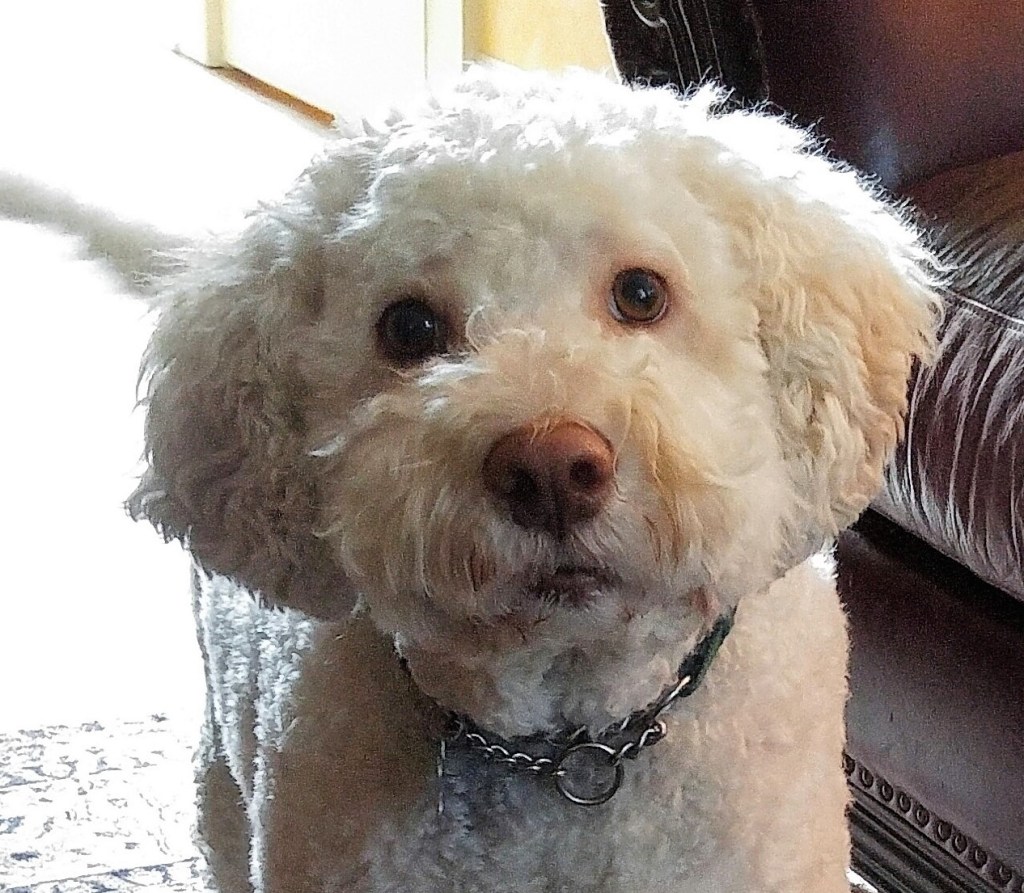
Greetings From The Future
I have a separate blog for my poetry (With Resistance). But a great friend gave me a beautiful journal for my birthday, and told me to write a poem in it.
So I did.
***
GREETINGS FROM THE FUTURE
Remember that girl from high school?
the one you called Horseface?
the one you called Lardo?
Remember that girl?
whose tit you grabbed?
whose ass you slapped?
Remember that girl?
the one you sent a dick-pic to?
Remember that girl
the one you photoshopped?
Remember that girl from high school?
the one you called Cunt?
Hello from your surgeon.
Hello from your dentist.
Hello from
your anesthesiologist.
Hello from
your traffic cop.
Hello from your chef.
Hello from
your IRS agent.
Hello from your hairdresser.
Hello from your mechanic.
Hello from
your loan officer.
Hello fellow travelers
from your pilot.
Effortless Bonding
When Henry was a puppy, we took him to puppy kindergarten so he could learn some of the basics.
We had taken Theo a few years earlier. It hadn’t worked out so great for him, but we decided to give it another try. Theo is smart but stubborn. Henry is more easygoing. Perhaps being a bit dumber may mean Henry might be less easily distracted.
But as with Theo, Obedience School didn’t exactly work out for Henry. This suboptimal result made us realize that it wasn’t the fault of the dogs. Or the trainer. The fact is, I am the worst disciplinarian in the world.
The dog I had for seventeen years when I was a kid was a wonderful dog, but it wasn’t thanks to me. Sarge just happened to be a good boy. And my expectations were low. If my dog didn’t poop in the house or bite anyone, I was satisfied.
Theo and Henry don’t bite anyone, and Theo never poops in the house, and Henry, now 4 1/2, only poops in the house occasionally (I charitably believe that it’s because he hates to bother me).
They listen if I have a cookie in my hand.
But they counter-surf. They rudely talk back when I scold them. Their leash skills have come close to dislocating my shoulders. They bark at everything. (I want an app that mutes all doorbells on TV.)
But they love us.
That’s what I want in a dog.
With a tad more listening ability.
Which brings me back to puppy kindergarten.
Theo had attended two sessions of puppy kindergarten. It’s not like he flunked out the first time. He performed admirably – for the teacher. I was rather embarrassed to tell our nice and highly competent teacher (who became a good friend, by the way), that his behavior at home remained slightly lacking (which is a synonym for atrocious). So about a year later, we re-enrolled him in a different class, with a teacher who didn’t know him (or us).
Theo was his typical little psycho-self. Wonderful and terrible – about evenly divided. I remember the parting words that the teacher, Marty, gave us. She said, “Theo is extremely smart, but he’s almost never listening. When he’s engaged, he’s anticipating; not listening. He knows what you are going to ask next. He’s one step ahead of you.”
I guess that was a compliment of sorts. Theo was a genius. On the other hand, I was not.
When we decided to try to teach Henry something (anything), we went back to Marty.
It had been a few years, but she recognized us. Although she was happy to see that my husband and I had returned, I could see she was surprised too. I imagined her wondering what in the world we were doing with another dog, when the first had been so obviously beyond our ability.
Marty’s first class – her introduction and overview – was done without the dogs. She wanted to meet the parents, and outline the course without the distraction of unruly, untrained, adorable puppies.
There were many of us. All happy new parents. All overwhelmed by our little ignoramuses.
Marty divided the group into three classes for training – little dogs, bigger dogs, and crazies. Totally irrelevant to the story, but amusing, were the crazies. When Mary asked which dogs should be in the crazy group, a good third of the attendees voluntarily got up and joined the group. One guy wasn’t sure, so Marty asked him what breed of dog he had. He said, “Airedale.”
Marty laughed, “You’ve got an Airedale and you aren’t sure whether he’s crazy? Are YOU in for a treat!”
Back to my story.
And this has been a long way to get to one of the best pieces of advice I have ever received in my whole life.
Marty had her little schipperke with her. He did all kinds of cute tricks, showing us how fun it would be to have a well-trained dog. And in between his performances, he’d run back to his crate and jump in happily and lie down.
Eventually, Marty brought up crate-training. She pointed out that a crate was not a punishment. And treats can be given in the crate, so the crate becomes an enticing place for a dog. And dogs should feel that crates are their safe place. A sanctuary.
However, Marty said, dogs don’t have to spend the night in a crate. It’s okay if they do, but they don’t have to.
Marty explained, “Your dog can sleep with you. Think about this. Sleeping together is about the most bonding experience you can have. And you don’t even have to DO anything! It’s the easiest thing in the world. Why, you can sleep through the whole thing!”
And I had a revelation. Maybe a minor revelation – what some call an “aha” moment. But that idea – that you can bond without effort – made so much sense to me.
Being there.
That’s all it is.
Effortless Bonding.
When I was a teenager, I loved my dad, but as happens with teenage angst, I didn’t exactly know how to relate to this hard-working quiet man. But I stumbled on a wonderful activity. On Sunday afternoons, Dad loved to watch a game on TV – basketball, football, baseball – whatever season it was. And I could sit with him and watch. We occasionally shared comments, mostly with me asking questions – “Why is that a penalty/foul/out?” But we didn’t even have to talk. We just watched together. So I got to be with Dad, and it was so easy.
Effortless Bonding.
Not everything has to be deep and soulful. Sometimes just BEING THERE is enough.
Visit loved ones. At home, in the hospital, in nursing homes. Just go. My sister used to go over to our parents’ house every day at 7:30 for “Wheel of Fortune.” When my father needed to be in a nursing home, she went there for “Wheel of Fortune.” And then it was my mother’s turn in the nursing home – “Wheel of Fortune.” They didn’t have to have meaningful conversations. They just guessed letters together.
Go to funerals and wakes. Some people worry that they won’t know what to say. Just say, “I’m so sorry.” Sit in the back if you want. But stay. Be there.
It can be easy to talk to good friends. But how about acquaintances? A co-worker going through a divorce? Go to the movies with her. Sit by her side. Watch a sad movie.
A wedding where you won’t know anyone? Go. Get all dressed up. Smile a lot. Thank the bride and groom for asking you to share their day.
A family party with relatives who argue? Bring a game. A deck of cards. Help with the cooking. Or better yet, clean up.
Sit on the porch with a neighbor. Give a kid a ride.
Yes, it’s incredible to have a profound connection with someone.
But don’t minimize the importance of your simple physical presence.
Your presence counts. Words can be secondary.
You can bond with the dog while you sleep. And you can bond with a human watching TV.
It doesn’t have to be complicated.
It’s effortless bonding.
Overwhelmed. But Improving
It’s been quite a while since I wrote last.
I’ve been very overwhelmed.
You probably don’t need the word ‘very’ with ‘overwhelmed.’ but it makes me feel better to use it. I need the extra emphasis that adverbs bring.
About a year ago, I took on an extra job.
I already had three part-time jobs.
I paint watercolor pet portraits. This business is my post-retirement passion. I paint a portrait or two every week.
And my paintings have led to a second job. I’ve been offering painting workshops at area libraries. The participants bring in a photo of their pet, and I help them paint their pet’s portrait. They’ve painted mostly dogs and cats, but we’ve also painted some fish, birds, horses, rabbits, and even recently, a tarantula.
It’s great fun, and I may even expand to senior centers. I usually schedule just one or two a month, but it’s demanding because a lot of preparation is involved.
Eighteen months ago, my local library was looking for a part-time bookkeeper. I hadn’t been looking for a job. But when I saw the ad, I just knew I wanted to do it. I’ve always wanted to work in a library.
I applied for the job, had an interview the next day, and was hired immediately. And I love it. To work in a place full of books with people who love books? Perfect.
So that’s three part-time jobs. That’s pretty busy for a ‘retired’ person.
Then there’s my writing, book club, house, two dogs, four cats, my online Spanish lessons…and a husband.
All while my mother was very ill.
And about a year ago, I got a phone call. Another job offer.
Our town’s small historic movie theater had closed during the pandemic. And now it was being re-opened as a cinema and arts center. The board of directors knew I was the library’s bookkeeper. Could I do their books too?
Well, I love movies. And free movies were involved.
But here’s the thing: I didn’t take the job for the money or the movies.
I took it because they asked me.
First – I am not good at saying no.
Second – My ego kicked in.
Yes, my ego definitely stepped over my better judgment. I didn’t apply for the job. They called ME. That made me special and important.
So I told them (and myself) that I could do it. It was a work-from-home job. No commute. I could keep my own schedule. An hour here and an hour there.
I paint my portraits. I prepare my workshops. I have good time management skills, right?
What I forgot was that I WANT to paint Ollie and Fluffy. I do not want to pay for soda and raisinets.
What I forgot is that it’s relaxing to put on an audiobook and listen to a story while I am preparing palettes for my workshop. It is not relaxing to clear paper jams from my printer when it’s eating bank statements.
And I did not realize how nice it is to file away my finished work in the library’s file cabinets and be done with it. I could go home. I did not realize that being a home-based bookkeeper meant that the work would be on my dining room table, just sitting there, making me feel guilty if I actually wanted to do anything else. Can paper give you a dirty look? It certainly can.
It didn’t take me long to figure this all out. It just took a long time to admit it.
Last Christmas, I had been doing the cinema bookkeeping for about six weeks. I was visiting my mother in the nursing home. Her illness had progressed to the point where she was not always coherent, but she was having a good day.
She remembered that I had taken on the extra job, and she asked me how it was going. Mom has always been my confidante, my sounding board. I told her the truth. A mild version of the truth, anyway.
I said that I wasn’t really enjoying it. It was “a lot.”
Mom is a worrier, even with some dementia, so I added, “But I haven’t been at it very long. I figure I will give it another couple of months to see if it gets better as I get more used to it.”
Mom said, “Well, okay.” But then she said – more lucid than she had been in months – “Just remember that two months can be a very long time when you are unhappy.”
I think now that she was so present and so clear because she was being my mom. She wasn’t helpless. She was needed. We all respond to that.
I did give the job another couple of months. But not two months. I gave it six months.
Every week, I was more stressed and more overwhelmed. I had dwindling patience and no tolerance for anything going wrong. I was always one minute away from a meltdown. My poor dogs. My poor husband. I decided in the summer that I would quit.
Telling my boss and the board took another few months. I gave my notice in October. And gave them another four weeks.
I have to admit that I worried about my fragile little ego. That I would feel bad if my boss easily found someone to replace me. If the new bookkeeper would make it obvious that I had done a terrible job.
Luckily, when they hired someone, I wished them all well and helped in the transition. If the new bookkeeper is competent and they love her, that will be wonderful. It doesn’t reflect on me.
That’s a revelation for me. A small triumph of sanity over ego.
So all in all, I worked for a year at a job I didn’t really like and didn’t have time for.
That’s enough, I think.
I’m happy to be overwhelmed at my normal level.
The Anniversary
Now that I have been working on Flash (short-short) Fiction, I remembered this story I wrote and posted eleven years ago. It was my attempt to think like a man, which I admit, I suck at. I’m seventy-one, and I still have no idea how men think.
****
THE ANNIVERSARY
Ah, damn. I did it again.
MaryAnn had that hurt puppy look that she reserves for only me.
“I just don’t understand you. What is so difficult about remembering one single day?”
“I’m really sorry.” I tried hard to keep my eyeballs stuck right in their sockets, as she always accuses me of rolling my eyes when I am insincere, and I was in enough trouble already.
Years ago, MaryAnn had this framed embroidery thing—she called it cruel, but I never really got that, since I thought it was kinda pretty—that her great-aunt Florence or Flora or some such old lady name—I know, Mildred—gave us for a wedding gift. It was all little silver bells, and in fancy writing it said, “The bells rang for joy… For MaryAnn and Frank… On this day… July something nineteen something.” It hung right above the dresser, where I saw it every morning when I put my wallet back in my pocket for the day. It was sort of like the emission sticker expiration on your car. It’s not like you really notice it, but it sort of gets absorbed, so you have this physical sense of the date. But about five years or so ago, MaryAnn redecorated the bedroom and she took the damn thing down. “It’s way too sweet,” she said, confusing me even more on the cruel thing. Anyway, there’s been hell to pay ever since.
The first year the embroidery came down, I forgot our anniversary. MaryAnn was upset and I took her out to eat at one of those too-expensive restaurants, and the next day—well, the next weekend—I went out and bought her pearl earrings.
The second year, I got credit for remembering. I think MaryAnn must have been complaining at the office because Mike, this guy who sits near MaryAnn in the next cube, calls me at work—at WORK—and says, whispering-like, “It’s your anniversary. MaryAnn would really like flowers. And sent to the office, so everyone will know what a prince you are.” “I owe you,” I said. “No shit,” said Mike, “a case of Rolling Rock.” Man, I was in good shape for weeks that year.
But Mike transferred to Claims a few months later. And I haven’t remembered since.
So MaryAnn was sitting across the table from me, with a look on her face like she just broke a toe.
“I really am sorry. You know I have a terrible memory,” I tried again.
“You don’t seem to have a bad memory for other things. If this was important to you, you’d remember. You just don’t care.”
Now it was taking real work for my eyes not to be pinging around my head. Why can’t she just TELL me? Why can’t she just warn me a day or so ahead? But no, she’s got this goddamn idea that if I don’t remember myself it doesn’t count.
“No honey, it’s real important to me. The best day of my life. I’m just shit-for-brains with dates.”
“Oh, yeah?” she countered. “I bet you remember the day you bought your first car.”
“Um, not really. A Ford, maybe. I don’t remember much about it.” I added, “I’m sorry I’m such a fuck-up. I’ll make it up to you. I will. Would you like to go to Newport for the weekend? I could buy you one of those tennis bracelets. Not with little tennis racquets, like I thought at Christmas, but with the real diamonds like you showed me.”
“I know you love me,” MaryAnn said. I think I had softened her a little. “But it hurts when you don’t remember our wedding day.”
If I could get her to smile, I would be past the quicksand part. “Can we hang up that embroidery thing that your aunt made? How about in the bathroom?”
She laughed. All set for a year, except for the diamond bracelet part. There goes a grand.
It was June twenty-first, 1970. I was sixteen. I wanted a car so bad. “How much money do you have?” my old man asked. I had three hundred and twenty dollars. We went to the used car lot that one of his poker buddies ran, and we picked out a 1963 Ford Galaxie 500. It had a police intercept 390 and a two-barrel carburetor. We took it out and it went one hundred and ten down Route 72. No problem. My dad handed over my money. We changed the automatic to a 3-speed tranny, and then it went one-thirty-five. It had silver gray interior, but the exterior was a girly cream color. I re-painted it this great Mopar color, Blue Fire Metallic, although I have no use for any Mopar product now. Man, I wish I still had that car. I loved that car.
#
REUNION
Flash Fiction – Week 3. This week’s prompt was “He said; She said.” The goal was to write a story under 500 words entirely through dialog between a man and a woman.
****
REUNION
He said, “What a view!”
She said, “It’s lovely. Come and sit here.”
“You look familiar. Do I know you?”
“Yes – it’s been a long time.”
“Did we work together?”
“No.”
“I don’t think we dated…I’d remember.”
“You’re right. You certainly would.”
“Go to school together? College classes?”
“Oh, longer ago than that.”
“Grammar school?”
“You’re getting closer.”
“You look so … you remind me of… “
“Yes?”
“It’s strange… I was going to say – my mother.”
“Everyone always said that.”
“What?”
“That I looked like Mom and you looked liked Dad.”
“Caroline?”
“Yes, Frankie.”
“But – You’re dead!”
“I am. Guess what that makes you?”
“Oh, God…I’m dead?”
“You were way too sleepy to drive.”
“Oh no! Did I hurt anyone else?”
“No, you were very considerate. You frightened the squirrels and birds that were in the tree, but they’re okay.”
“Is everyone sad?”
“No one knows yet. Just me. But I’m sure everyone will miss you. You’re a good person, Frankie.”
“That’s not what Linda said.”
“Divorce means nothing. Living is such a lonely job; it’s a miracle anyone can stay together.”
“How would you know, Carrie? You were eight years old. And sick most of the time.”
“Sick people notice everything, Frankie.”
“Wait. I’m thinking about you being eight. How come you’re not still eight? Do we continue to age? Like, is Abraham Lincoln like 200 years old?”
“Ha! You should see Shakespeare! No, seriously. you can be whatever you want.”
“And you wanted to grow up?”
“Not so much that. I wanted to tell you all kinds of things. Be your sister for more than eight years. So I didn’t want to be a grownup as much as I wanted to talk to you. If I were eight and you were forty-five, I think we’d run out of conversation pretty quickly.”
“Could you be eight again after?”
“Sure. We can be eight and ten. We can talk about bicycles and Saturday cartoons.”
“Both of us? We’re free to do that?”
“We’re free to do anything. There’s no greater freedom than being dead.”
“So what did you want to talk about?”
“About Mom & Dad. How after I died, they had so much grief they used up all the air. It consumed them. They didn’t leave much room for you.”
“No, they didn’t.”
“When I disappeared, I made you disappear too.”
“I lost everybody. But especially you.”
“I’m sorry.”
“I wasn’t too sleepy to drive. I was too drunk to drive.”
“I know.”

ALL I HAVE LEFT IS THIS PHOTOGRAPH
Flash Fiction Course. Week 2. I was given the prompt, “All I have left is this photograph.” Goal: Write a story in under 1,000 words.
******
ALL I HAVE LEFT IS THIS PHOTOGRAPH
Everybody told me not to go.
My parents, of course. My mother cried. My sisters said I was nuts. My father said if I went, I was not welcome to come back. Ever.
I thought my friends would be more supportive. But they mostly hated the idea. “Communes are not like what you saw in ‘Easy Rider,'” said Michael, with no experience but lots of opinions. As usual. “Besides,” added Karen, “Even in Easy Rider, the whole place was kind of creepy.” “You’ll be murdered,” said Janice.
But it was 1970 and I was nineteen, and I was swept away by the adventure. I wanted to experience something that I instinctively knew would not last. Communes were a cultural moment. I wanted to be in that moment.
So I stuffed a few things in my backpack, and I left. I took a bus. I had heard of a place. Not out in the desert like in Easy Rider, not on a farm out in the country. An abandoned factory in Pittsburgh. Kids had turned it into a home. Everyone was welcome. So they said.
It was a dump. It was filthier than anything I had ever seen. Trash everywhere. It stunk.
Their leader, if you could call him that, was as creepy as Karen warned me about. Bryce. A made-up name for sure. “What can you do for us?” he asked. I guess not everyone was welcome. “I can pick up all this garbage. I’m a born cleaner,” I replied.
So I stayed. It took weeks to pick up all the trash. I took empty boxes out of the dumpster at the nearest supermarket, and brought them back to the dumpster filled with garbage. Sometimes I got a ride. Mostly I walked. It did not inspire the group to a neater life.
There were sixteen of us. Bryce was the oldest. He was 26, he said. I thought more like 46. There was lots of sex and drugs, like my parents imagined. But there was also music and books and conversation.
Four of us had paying jobs. They kept us in food. One has happy to do it. Maggie. The other three, Sean, Joe, and Billy, were resentful. They expected more gratitude. Of the sexual kind mostly. We obliged.
There were three babies there and one on the way. Patsy was mother to one and caregiver to all. She breastfed all the babies. She looked pale and exhausted.. The other mothers were stoned or just plain uninterested.
I stayed five months. I left in January. The factory was cold. I was hungry. I was tired of picking up trash. I saw the new baby being born, and I was awestruck. But he died.
All I have left is this photograph.
See look. There is Bryce, who does not look fatherly, as he sometimes was. He looks demonic, as he often was. Here are Sean and Joe and Billy. I slept with them all. I was lucky I didn’t get the clap. These two are Maggie and Patsy. I loved them. And the babies. Here are the others whose names I have forgotten after all these years. The day we took this photo, no one was fighting. It was exceptional.
And see – .right here. This is Jake. He came with me when I left. The best thing about that time. He saved me.
When I came home, my father held me and cried.
Dad and Jake were inseparable for the next nine years. Jake saved all of us. That’s what dogs do.
ENOUGH
I haven’t written anything in a while, but I’d like to get started again.
So when I saw that my library was offering a short course in Flash Fiction, I signed up. I am hoping it just gets my creative juices (and motivation) kickstarted.
This is my first assignment. Write a short-story story where the first sentence is repeated as the last sentence. (Please remember, this is Fiction… I’m fine and thriving, and wouldn’t want anyone to worry.)
***
ENOUGH
It’s enough.
In the very back of my closet, in the dark and the dust, is a garment bag. Inside is my wedding gown.
My gown has a secret pocket – to hold a tissue or perhaps a good luck charm. Right now it holds $187.14.
Every Wednesday, Walter gives me eighty dollars for groceries. I walk to the supermarket, as I have no car. I buy what I can carry. I have thought about taking a cart from the store to bring the grocery bags home, but I have learned to carry a lot.
When Walter comes home from work, I line up all my purchases with the receipt and the change. It all adds up perfectly. It has to.
For three years and two months now, I have gone back to the supermarket on Thursday. I return things. I return tuna and skip lunch. I return beans and soup and other canned things I can water down after serving Walter his portion. I return the cream Walter doesn’t take in his coffee and mix up the powdered creamer to put it in the little pitcher. It looks the same. I keep the powder in a tin that says ‘yeast.’
I exchange the big bottle of aspirin for the small size. I pour the pills into the bigger bottle I keep in my purse, and toss the little bottle in the trash can in the parking lot.
I return the expensive tampons and buy the cheap stuff.
I always go to the same cashier, the old lady at register six. She takes my returns and gives me the cash. No questions. She calls me Honey.
Every morning Walter kisses me goodbye when he goes off to work. “Sorry,” he says if I wince. I winced this morning.
In the secret pocket of my wedding gown is $187.14. Today is Wednesday, so I also have the $80.00 for groceries. $267.14.
It’s enough.
I reach into the back of the closet and pull out the garment bag. I take the money from the secret pocket. I drop the gown into the back of the closet – into the dark and the dust.
I don’t own a suitcase, but now the garment bag is empty. I take my good skirt and two shirts and three changes of underwear.
The bus ticket to Tampa is $189.00. I will have $78.14 left.
It’s enough.

Searching
This is my first Mother’s Day without Mom.
I’m 71. I’ve had seventy Mother’s Days with her, so I am ahead of the game, I guess.
And I don’t even particularly like Mother’s Day. There are too many women (and men) excluded from the celebration. Those whose mothers have died, or mothers whose children have died. Those who had hurtful relationships with their mothers. Those who wanted children but have been left out of motherhood.
I am in the last group. But now I am also in the first group.
So I don’t like Mother’s Day.
A few weeks ago, I wrote about my mother’s death.
Only I didn’t, really. I wrote a bit about her life. I wanted to remember her life, not her death.
But today, I find the need to write about her death.
I was with her.
It was unintended. We knew that Mom’s time was drawing to a close, and we were spending more time by her side. But this day was not different from any of the other days of the previous weeks. It was just my fortune (both good and terrible) to be the one who was there.
I was almost not there. I intended to leave to attend my book club. It was my turn to lead the discussion, and the book was one of my favorites. I was very much looking forward to it. If I left by 2:00, I’d have plenty of time for the drive to the library.
One of my sisters was coming to take my place, but 2 o’clock came and she had not arrived. I thought it would be okay to leave anyway – my sister would arrive shortly.
So I got up to go, and as I leaned over to give Mom a kiss, I realized that she had changed. She had been sleeping, but now she was awake. But she was not looking at me. Her eyes were darting around the room, looking but not seeing. Looking for something not there.
So I stayed. I took her hand. I watched her shallow breathing and the way her eyes continued to search everywhere but not find me.
I said, invoking her children who were not there – “Christine loves you. Claudia loves you. Tommy loves you. I love you.”
I repeated that three times.
She died.
I had not called for a nurse. What would a nurse have done? Not save her. She didn’t need saving.
Maybe I needed saving. So it would not have been my fault.
But I know it was not.
I am haunted, though, by her distant searching. Who was she looking for?
I am comforted by knowing I was there for her. I am comforted knowing that her death seemed gentle.
But I am haunted by the thought that I was not who she wanted in those last moments. Was she seeking, wishing for someone else? Did she want a different child holding her hand?
Oh, I was a good daughter. I know that.
But what if I had called a nurse? Could the nurse have given Mom ten more minutes, so my sister could have arrived in time? Would Mom have stopped searching then? Could a nurse have given her another few hours so we all could have been there?
The truth is, I didn’t want anyone to save her.
I wanted her to decide. And she did.
I hope what she was searching for was her freedom.
I am searching for mine.
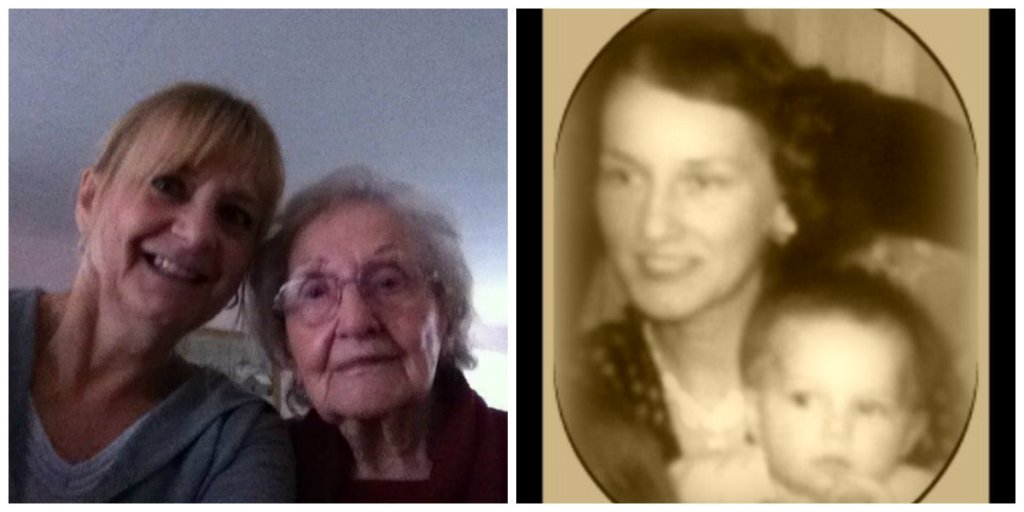
Remembering
My mother died a month ago.
She was 98.
I don’t know what to write about her now. I’ve written about her so many times already; I’m not sure what else I could say.
She was bright.
She was funny.
She was beautiful.
She was kind.
She was a daughter, a wife, a mother, a grandmother, a great-grandmother. She was a nurse. She excelled at all her roles. I cannot think of a thing she failed at.
Is there such a thing as a cheerful worrier? I think my mother would fall into that category. She worried incessantly, but laughed at herself while doing so. “No one is better at picturing her kids in a ditch,” she once told me. I remember a time when my brother was late coming home from a math tournament or some such weird event, and my mother called the school and made the janitor check all the bathrooms. She was sure he had been locked in. Who locks bathrooms from the outside? Nevertheless, she was sure. For decades afterward, anytime anyone was late, Mom would smile and say, “Maybe they are locked in a bathroom.”
Mom had good priorities.
She believed in education. She had come from a time and a culture where educating women was considered unimportant. But Mom fought hard for her education. She became a nurse. I learned only recently (from Mom herself) that my grandmother had secretly paid my mother’s tuition. So women’s education (and all education) is in my family genes.
All of her children have advanced degrees. We all did well in school, which may be predominantly due to the intelligence genes on both sides of the family. But while my mother stressed the importance of learning, she never put pressure on us to achieve high grades. Learning was essential; grades were insignificant. I remember in my frequent calls to Mom when I was in college, our conversations always ended with the same advice from Mom. She didn’t say, “Study hard.” She said, “Have fun.”
My mother was passionate about fairness. Not only in her own family – she couldn’t even bear to watch a TV show where someone was framed or blamed for something they didn’t do. “NO!” she’d yell at the TV. “That’s just not right!”
But especially with us kids. She counted the Christmas presents, the jelly beans in our Easter Baskets, even the size of our birthday cards. “Even-Steven” was one of her common expressions. She never wanted to show favoritism towards any of her kids.
Just a few years ago, my mother told me a story. We girls are older than my brother, and when he was growing up, my parents were doing better financially than when my sisters and I were little. Mom said that she and Dad were out having lunch with my little brother one day, and he asked (as we were all taught to do), “What can I have?” And my mother replied, “You can have anything you want.” And Mom said that she suddenly realized something that made her feel terrible. She said, “I’m so sorry that I was never able to say that to you.”
My mother had 97 fantastic years of happiness and good health, but her 98th year was difficult. The decline in her health was unrelenting.
I’d rather focus on all those other years, but here is one thing from this time that I will remember:
Just a few weeks before she died, I was telling her about an issue I was having with one of my several part-time jobs. Mom wasn’t well at all, and I wasn’t even sure she understood me, but I liked telling her everything anyway – I may be in my seventies, but she’s my mom. I told her I was going to give the job two more months to see if things got better. Mom said, “Well, okay, but just remember, two months is a long time if you are unhappy.”
I will remember, Mom.
And about not being able to order anything I wanted? I already had everything I could want.

